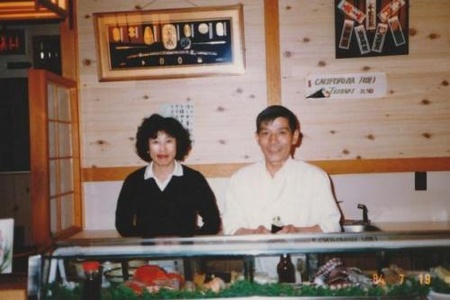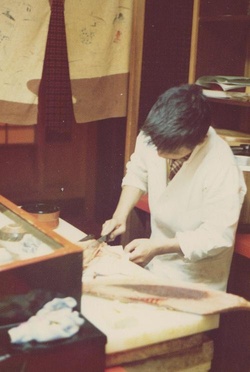For months, news of Aki Restaurant’s closure circulated foodie blogs and tweets, but never from an official media announcement from Aki management. Only a simple message of appreciation to guests hangs outside the doors of the restaurant. As humble as their notice of closure, Aki Restaurant has been a quiet player in the local sushi scene, but its history leaves a profound legacy in Vancouver’s culinary heritage.
After 13 years in the discrete downtown basement location, Aki Restaurant is one of several businesses affected by the 745 Thurlow St. demolition. The clearance is to make way for a 24-storey office tower scheduled for completion in spring 2015.
“We initially received the notice of demolition in 2008 before the Olympics, but the project was put on hold due to the recession, ” explained Brian Takeuchi, head of operations and son of owner, Aki Takeuchi. “But the project is back on track now, and the final notice arrived in September of 2011.
"It was a bit unexpected to be honest.”
A place to be unapologetically Japanese
Since the rise of Vancouver’s sushi culture in the 1990s, the city’s culture-seeking foodies have come to embrace Aki’s charming, unpretentious atmosphere and Japanese comfort food. For the Japanese community, Aki has served to be much more than a place of gathering, but a space where they could be unapologetically Japanese.
First established in the 1960s, the creation of this family-run business stemmed from an 18-year-old’s ambition to bring ‘raw fish’ to Vancouver.
“At that time, Vancouver only had a couple of Japanese restaurants in the Japantown area. . . . Geisha Gardens and Tokyo Sukiyaki,” Brian said. “But they just served the cooked stuff, kind of like Chinese-Japanese fusion.”
But then along came his father, Aki Takeuchi.
Born 1935 in Steveston, B.C., he was a regular kid until World War II escalated, and the Japanese Canadian community was enveloped in animosity and racist attacks. The Takeuchi family fled to Osaka, Japan prior to the War Measures Act of 1941 which gave the federal government the power to intern all "persons of Japanese racial origin", regardless of whether they were born in Canada.
A life-changing sushi experience
When the war ended, Aki returned to Canada by himself, after losing both parents to disease. Settling into Vancouver, gardening became his profession until a road trip to Los Angeles that changed the course of his life forever.
“My dad and a few of his buddies decided to go to L.A. for a vacation, but the funny thing is, they never actually made it that far.”
“They ended up blowing all of their cash at a sushi restaurant in Fisherman’s Wharf in San Francisco, and they couldn’t even get back home.”
Stranded and broke, Aki decided to take a job at that sushi restaurant. What began as temporary stint resulted in five years of training, and the realization of Vancouver’s need for a similar sushi establishment.
“While my dad worked in San Francisco, he noticed travellers from Vancouver would come by and take out sushi to bring back to Canada.”
“It sounds a bit ridiculous now, but there was absolutely no where to get sushi in this city.”
Vancouver's first raw fish restaurant
So in the summer of 1963, Aki opened the original Aki Restaurant at 374 Powell St, and served Vancouver its first ‘raw fish.’
“Dad had a great relationship with the Chinese fisherman who would always get him the freshest catch.”
But the City Council was quick to notice the bizarre activities of this Japantown restaurant.
“Back then, sushi was unheard of, so there wasn’t even a license to serve raw fish. In order to convince city officials of this ‘unusual’ cooking style, dad ended up cooking a complete Japanese meal for all of them. I’m assuming that went well,” he chuckles.
Over the decades, Aki Restaurant became a launching pad for many Japanese chefs who eventually set up their own shop in Vancouver, including Chef Koji who opened Koko’s on Hastings. Aki has also witnessed Vancouver’s sushi restaurant count grow from just one to over 200, as well as the emergence of the fusion-style izakayas.
Yet through the waves of trends and generations, Aki’s menu and culture has remained unchanged -- a tribute to their timeless concept of simply being Japanese.
Aki, now 77-years-old, has worked every day since that opening day in 1963. Until the final moments of service on February 15, he has stationed himself in the back-of-house prepping and washing dishes.
“Dad doesn’t like to be in the spotlight – he doesn’t care who brought sushi to Vancouver, and he hates it when he’s asked, ‘who really made the California roll first?’ He just wants to simply do his job.”
Brian hopes to reopen at a location nearby, but the rising costs of downtown leases may force his family’s business to come to an end.
“There’s no doubt we want to open again, but if the numbers don’t add up, we can’t afford that kind of risk.”
Although the Takeuchi family and its loyal guests remain optimistic for the next chapter, a permanent closure of Aki Restaurant would mean Vancouver has lost a piece of its history, the oldest and longest-running Japanese restaurant remaining.
* This article was originally published in VO (The Vancouver Observer) on February 17, 2012.
© 2012 Lisa Nakamura Nguyen




